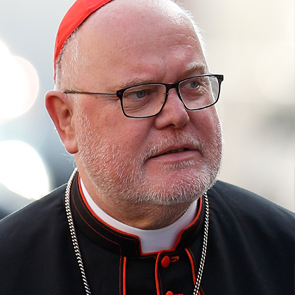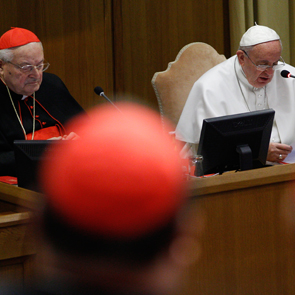Decentralisation, the Vatican's finances and the need for qualified lay professionals are among the topics discussed by cardinals from around the world gathered in Rome by Pope Francis to discuss the reform of the Roman Curia.
A consistory called by Pope Francis is examining proposals put forward by the so-called "C9" Council of Cardinals for a restructuring of the Church’s central administration.
The two days of meetings will be followed by a ceremony during which Francis will create 20 new cardinals, many of them from outside Europe. You will be able to watch the ceremony here.
Briefing journalists on Friday, Vatican spokesman Fr Federico Lombardi said that this morning 164 cardinals heard from Cardinal George Pell, Prefect of the Secretariat for the Economy which oversees the finances of the curial offices, who gave information on the balance for the coming year.
In an interview with Crux, the Catholic news website, the cardinal said he told the cardinals that the Vatican had almost over £950 million in hidden assets. The discovery means the Holy See is in a significantly stronger financial position than previously thought. However, the cardinal said the gain in the value of assets is offset against a £650 million deficit in the Holy See's pension fund.
Alongside Cardinal Pell the group heard from Jean-Baptiste de Franssu, president of the Vatican bank (Institute for the Works of Religion), and Joseph Zahra of the Pontifical Commission for Reference on the Organisation of the Economic-Administrative Structure of the Holy See (COSEA). Mr Zahra spoke to them about the administrative challenges facing the Holy See.
Cardinal Reinhard Marx, the co-ordinator of the Council for the Economy, which oversees all administrative and financial activities of the Holy See, also spoke.
It was the first time that the College of Cardinals had received detailed information about the financial health of the Holy See.
During the meetings, dozens of cardinals spoke about the work of the curia, and many of them stressed the need for decentralisation and collegiality. Others emphasised the need for qualified professionals from all over the world to work in the Vatican. They said there was a need for an enhanced role for laity, particularly women.
Among the proposals are the creation of two new congregations – one dealing with justice and charity and the other with laity and the family. It has been speculated that these new dicasteries will subsume other Vatican offices.
 In recent months the C9 has been working on a new Apostolic Constitution – a structure of governance – for the reform of the Roman Curia, but this has yet to be agreed.
In recent months the C9 has been working on a new Apostolic Constitution – a structure of governance – for the reform of the Roman Curia, but this has yet to be agreed.
Yesterday Pope Francis addressed the 165 cardinals gathered in the Paul VI Hall in the Vatican, telling them that “reform is not an end itself”.
Instead, he explained, it is about promoting a more effective evangelisation, a fruitful ecumenical spirit and a strengthening of unity in the Church.
The Pope also pointed out that reform had been strongly advocated by the majority of cardinals who met before the conclave in 2013 which elected him.
Echoing the remarks he made before the gathering of the Synod on the Family last October, Pope Francis told the cardinals yesterday to speak with parrhesia – the Greek word for speaking frankly or candidly. And he called on them to bear in mind the “supreme law” of the Church, which is the salvation of souls.
“The goal to be reached is always that of promoting greater harmony in the work of the various dicasteries and offices, in order to achieve a more effective collaboration in that absolute transparency which builds authentic synodality and collegiality,” he said adding that the process will take time.
It is understood that significant reform will not be announced before 2016, and that there is resistance to change from within the curia.
Speaking to Vatican Radio, Cardinal Cormac Murphy-O’Connor, a supporter of the candidacy of Cardinal Jorge Bergoglio as pope in 2013, said that reform will take time and needs to mature.
“If there’s going to be a slightly new way of exercising authority with the bishops, he says, you have to do it step by step and we’ll be hearing some of those steps in the next few days,” he said.
Today, the Pope is to name 20 new cardinals, a number of them from far-flung places across the world, at a ceremony in St Peter’s Basilica.
Among those receiving a red hat is Bishop Soane Patita Paini Mafi of Tonga. The naming of a Tongan cardinal is a first and has become a national event on the island. Many Tongans are travelling to Rome for the consistory, including the King and Queen.
Red hats will be given to bishops from other countries that have never had a cardinal before – Myanmar and Cape Verde.
Top: Pope Francis updates the cardinals on the progress of reform of the Curia. Above: Cardinal Marx. Photos: CNS




 Loading ...
Loading ...